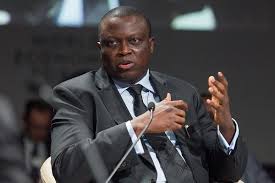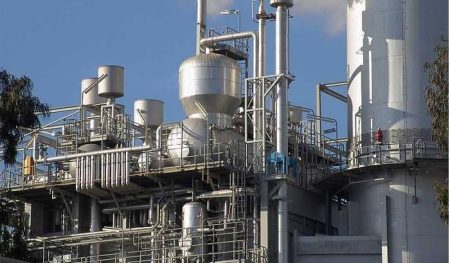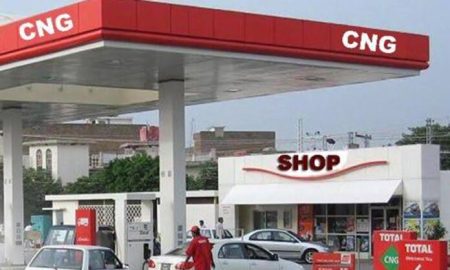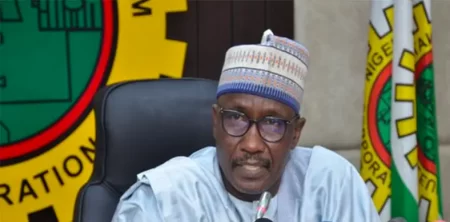30 May 2016, Lagos – Managing Director of Nigeria LNG Limited, Mr. Babs Omotowa spoke to Ejiofor Alike on the changing dynamics in the global liquefied natural gas market, positing that for Nigeria to succeed in her current drive to attract foreign investments, she must honour existing agreements with investors to assure others of the stability of the operating environment. Excerpts:

The issue of granting incentives to NLNG by the NLNG Act has been a bone of contention between your company and some agencies of federal government. What are those incentives granted to you under the NLNG Act?
It actually took more than 30 years for NLNG to come to fruition – most of that time several investors, who needed to bring in money to invest in the project had doubts about Nigeria – whether it was a suitable place to put so much money. So, after 30 years, the NLNG Act was put in place, which enabled the investors to have the comfort to bring in over $6 billion that was used to build the project.
There are a couple of aspects of the NLNG Act. The first aspect is that it grants 10 years tax holidays for Company Income Tax. The 10 year period has expired and we have been paying Company Income Tax. It also has apart, which is about exemption from Customs Duties during construction. That exemption is only for the construction period. After we finished constructing, of course, we have been paying Customs Duties. And then it has an exemption from any other new taxes or levies that will be imposed. You can understand that because if you don’t protect the company, any economics they would have done would not work if any new taxes could be unilaterally imposed.
But the last part of the law is that it has what is called assurances and guarantees, which is that the country, through that law said that it assures and guarantees the investors that the country will honour the Act and not change it. So, that is what that Act is and it has enabled the country to attract over $6 billion from its shareholders and that is what has enabled us to generate over $33 billion that has been paid to the government; it is what has helped us to reduce gas flaring from 65 per cent to 25 per cent.
Will these incentives continue to exist as long as the company exists or do they have a life-span like the 10-year tax holidays?
The Act itself is very clear that the incentives granted will be for the life of the project. And this is normal and there is nothing unusual about this. In Nigeria, we have the Free Trade Zones (FTZs) either in Lekki or in Onne and in those areas as well, the applicable incentives are in perpetuity. They don’t even pay Company Income Tax; they don’t pay any tax at all and those things are also in perpetuity. So, perpetual incentives and guarantees are not unusual, especially for export based projects, because you want the companies to be able to compete externally.
So, if you over tax them in your country then they will never ever be able to compete and if they can’t compete, then you can never earn any revenue or foreign exchange for the country. So, the reality is that there are even other more generous incentives in Nigeria than NLNG Act and if you look at every other LNG countries of the world – if you go to Angola; if you go to Oman; if you go to Malaysia and even Trinidad –they and others all have incentives and many of them are even more generous than we have. So, it is not an unusual incentives and if you think about it – if you ask somebody to bring $6 billion to Nigeria, you need to assure him that you wouldn’t tomorrow create a new levy that will wipe off the relevance of his project economics or his ability to obtain return investments. Returns after all, is the major reason why investors bring their money to the table.
Why this proposed amendment of the Nigeria LNG Act in the first place? Do we really have a need to amend this NLNG Act at this moment?
This current effort is widely perceived to be an attempt to force the NLNG to pay NDDC levy of three per cent. That is what this current effort is. And there are two fundamental things to look at about that. The NDDC Act itself is focused on trying to redress the ecological and environmental damages in the Niger Delta, that is, companies that are creating oil spills; that are creating flaring – for them to pay back to the Niger Delta Commission, so that they will mitigate those impacts.
However, NLNG does not fit into that kind of situation; we actually are cleaning up the Niger Delta. NLNG cleans to help reduce gas flaring and since we have been there, we have progressively reduced it from about 65 per cent to today’s less than 25 per cent. So, we do not create any pollution for which the NDDC Act itself was set up. The second thing is that this case has been taken to court- NDDC has gone to court since 2005. They went from High Court to Appeal Court and to Supreme Court. In both the High Court and the Appeal Court, the case was ruled in NLNG’s favour. They went to Supreme Court and their case was dismissed. So, clearly, it is not about the law because the law states clearly that NLNG is exempted and in the NDDC Act, we are not a polluter but an entity that cleans the environment. So, that is why clearly, we believe that this should not apply to NLNG and we should not jeopardise the country because of the attempt to make a change against a promise made by the country.
Does the Act make any provision for amendment?
Of course, any Act can be amended but what was written in that law is that you should do it in collaboration as the Act has its foundation in a contract between Nigeria and the investors. So, the government must be involved in that- the executives; you should involve the shareholders, whom you have made the promise in the Act to and that should be done on a collaborative manner and not just one side on its own making changes, changes, which is what that law provides assurance for.
We know that NNPC is the largest single shareholder in the NLNG but the other foreign investors combined hold the majority share. When two or three people make laws to establish a business and they want to change the laws, I think all of them should agree together. So, what is the role of the other shareholders in this proposed amendment?
In the recent public hearing, the NNPC was there, the Attorney General was represented and all the shareholders were there and they all canvassed the position that they don’t support any changes to the law at this point in time. So, as you rightly said, two people agreed on a contract and one party said they want to change but the other people said they don’t want to change right now. I think as we said, for a country that needs to be respected internationally, it is important that we honour our commitments and words. The view in effect is that when a country strategically important country like ours which is committed to investments and development as we are, makes a promise; when we give an assurance, the honourable thing to do is to honour that agreement and not make changes unilaterally because it will hurt the country and because other people will not want to come to Nigeria to invest.
One irony inherent in all of this is that over 70 per cent of what is being sought in the amendment is already being paid by NLNG to the Federation account. So this amendment will just be to reduce what goes to Federation account and is currently being shared by all State Governments, to pay to an agency of the Federal Government, and is this what we should jeopardise our national interests for?
What is the position of the NNPC in particular, in this proposed amendment?
NNPC was at the public hearing and they presented their position very clearly that Nigeria should honour this Act and that there should be no changes in the Act because it will hurt the country. You want to change because of the little you will earn here but there is a bigger negative impact to the country. Nigeria is today looking for more money to invest in gas facilities for domestic power. The President has just gone to China, US and UAE to try to attract investors. If they see that you are changing promises that you have made to earlier investors, then they are very unlikely to want to bring any investments to Nigeria in the future.
In one of the debates at the House of Representatives, it was alleged that you also pollute the environment through flaring. How do you respond to this accusation?
I cannot comment or add any further wisdom to what people say because the facts are there and visible to every objective observer. You can also check with the NNPC and the Department of Petroleum Resources (DPR), who are the regulators and they will re-confirm that NLNG has been the biggest contributor to reducing gas flaring in the Niger Delta. We were set up for that purpose. NLNG was set up for only two purposes – to help to eliminate gas flaring and to help to monetise the gas resources to create more revenue for the government. We have been a key factor in helping to reduce gas flaring in the Niger Delta from 65 per cent that it used to be to less than 25 per cent. If you ask the experts who know, and the NNPC and the DPR, they will confirm that NLNG is not a polluter – it is indeed the biggest effort by government to clean gas flaring in the Niger Delta, in addition to being a very sound and profitable investment.
The Minority Leader in the House of Representatives, Hon. Leo Ogor was reportedly quoted as alleging that by not contributing to the NDDC Fund, the NLNG is not doing enough for the Niger Delta. Do you think he was right?
That is simply not correct, and again the facts bear me out. We probably, are the biggest single individual company that contributes to the Niger Delta in terms of capacity development. We have spent close to $200 million developing the Niger Delta. We recently offered the federal government to contribute N60 billion to help build the road that transverses through Bodo, Ogoni, Andoni to Bonny. These are all communities in the Niger Delta. We have built a vocation school with unique measurable benefits in the Niger Delta; we provide 24 hours of electricity, pipe borne water, roads; we provide over 3,000 scholarships to Niger Delta citizens. We have just built a N340 million laboratory for the University of Port Harcourt; we have also been involved in health issues, building hospitals and constructing schools and other infrastructure. So, there is no doubt that our contribution to the Niger Delta has been huge and significant. But even going forward, we have offered to the NDDC that we are willing to work together on projects. We have full, unequivocal commitment to the Niger Delta; we are willing to work together on projects, which we can identify every year and together, we make it happen. But we believe that we can develop the Niger Delta without jeopardising Nigeria’s overall best interest. Remember, we are already paying most of these monies to the Federation Account.
So, it is not that it is monies that are coming out of NLNG; it is monies that should have gone to the Federation Account that will now be coming into the NDDC Levy. So, you will be reducing the Federation Account for this levy in reality and reducing what is available for all States and by extension millions of needy Nigerians to benefit from. But we do not think that would warrant now putting in jeopardy, foreign investments. For example, we are making progress in building Train 7 of the NLNG. If we get to the final decision on this, this will attract $10 billion of investment in building our facilities and additional $15 billion to build the upstream gas projects that needs to be done.
That in itself will create more than 30,000 jobs in the Niger Delta in both the NLNG and upstream companies. If you make these kinds of amendments as proposed to the NLNG Act, which will send signals to investors that you are not a reliable or trustworthy country, and then you can reasonably forget such investments. I don’t think that is what the country needs now. We need jobs; we need more projects; more revenue for the government and to create activity in the contractor environment as well.
You said that Train 7 of NLNG would attract investment of $25 billion?
Yes, $25 billion in both the NLNG side and the gas supply projects of the upstream companies.
How much revenue will Train 7 generate?
You will find out that in this exercise, this will bring 40 per cent increase on what the NLNG is doing today because Train 7 is 40 per cent increase in our volumes. So, when you think about it that in 2015, the NLNG contributed $4 billion to the Nigerian economy through taxes we paid; the dividends we paid and what we pay to Nigeria to buy gas from the upstream companies. If you take 40 per cent of that, it gives you an indication of what we will be delivering every year when a project like this is built.
We have been talking about Train 7 for close to a decade. What is actually delaying the FID?
In 2008, we were ready to take the Final Investment Decision (FID). But due to some discussions at that time around other priorities, especially from the federal government side, the FID could not be taken at that time. What that has meant is that overtime, the contracts that should have been put in place – the bids have all elapsed. So, we have to go back to the starting block. Currently, we are in what is called the basis for design stage. When we finish this stage in the next few months, we move into the Front End Engineering Design (FEED) and finally again, we go back into tendering for the activities- what we call EPC (engineering procurement and construction).
That will enable us take the FID. We are working hard because we have so much support now from the government. Both the President and the Minister of State for Petroleum are very supportive and we want to take FID during this administration. Having said that, the current low price of oil, of course, makes it more challenging. So, we also have to work at reducing the cost of the project. We are very determined and we are making all the progress now to take this FID during this administration.
But there are concerns in the area of gas supply to the proposed Train 7 due to the current gas supply challenges in the country. How are you sorting out the issue of gas supply?
Nigeria has much more than enough gas; we are one of the top 10 countries in the world with gas reserves. Today, we have 180 trillion cubic feet of gas that is proven, most of which was discovered by accident while exploring for oil. It is known by analysis that Nigeria has about 600 trillion cubic feet of gas. Just to give you an idea; out of the 180 TCF of gas that we have, the whole requirement of NLNG for 25 years will be less than 30 TCF. So, it is small when you think of 30 out of 180 or 30 out of 600; it is not much. So, Nigeria has more than enough gas for export; for domestic power and for petrochemical. If you look at a country like Australia, they have less than 60 per cent of what we have in gas reserves and they are building LNG plant that are at least four times what we have built and they have power generation of more than 40,000 megawatts. So, in real terms gas availability is not our problem; our challenge is creating the right business environment to attract investors and be able to start and mature key projects in a secure environment and with the right regulatory framework. Those are the kind of things we need to focus on. But the gas itself is more than enough in the ground.
How has the current drop in the price of oil affected the price of LNG in the global market?
It has affected us because gas prices are linked to oil price being both energy sources. There is a 70 per cent correlation in the price of oil and the price of gas. So, when you look at NLNG’s Facts and Figures publication, which we released a few weeks ago, even the revenue of 2015 was 40 per cent lower than 2014 and even this year, our revenue will even be lower than in 2015. So, the gas market has seen a big drop. This year, for example, in Asia where we use to get up to $15 per unit of gas, we get today about $5-6. In Europe where we used to get $9 per unit, we get about $5 -$6. So, the price of gas has also come down; revenues have dropped. But we are working very hard to make sure that we still remain profitable. We are working hard to make sure we find new opportunity areas; higher value markets and we are also making sure that we drive operational efficiencies and we are reducing our costs so that we can still be profitable and continue to return good revenues to the coffers of the government and our shareholders.
Trying to amend the NLNG Act at this point has been considered by some oil and gas industry operators as trying to change the goal post at the middle of the game. What is your advice to the people championing this amendment?
My advice is that Nigeria is such a blessed country in terms of natural gas reserves. We can do more by creating more values; we can spend our time to create even a bigger pie and a bigger cake. We need to be able to build more gas power plants, build more LNG plants; we need to be able to build more petrochemical plants; we need to really create an industry that can employ hundreds of thousands of people if not millions, and what we need to spend efforts on is looking at what is militating against us achieving that as a country. Why don’t we yet have huge petrochemical plants in Nigeria? Why don’t we have more gas power plants working very well? Why don’t we have more LNG plants? How do we attract investments?. How do we create a business environment that allows these because we need to create jobs for our people and generate more revenue. This is what we need to spend more of our time on, rather than today we seem to spend more of our time trying to cut and share the little cake that we have into different shapes. I think we need to put more energy into value addition; more energy into value creation; that is what this country requires from all of us in various leadership positions – be it in the companies; in the legislature or executive. I think that is what the country deserves.
You said that you have spent $177 million in corporate social responsibility in the Niger Delta. What are your future plans? Have you finished spending?
We will continue to do more. We have gone round to build engineering laboratories, for example, to support technology learning and research in six universities across the country. We have built more capacity across the country; we are doing quite a good number of projects. As I mentioned, we are committed to partner the federal government and contribute N60 billion, which is about $300 million to build the road across Bodo, Adoni, Ogoni to Bonny. We are working with the community in Bonny where we are putting N3 billion every year to implement a master plan for Bonny that hopefully will in 25 years’ time make the community look more like Dubai or Singapore. So, we will continue to do quite a lot of capacity building. We have spent quite a lot in education. We believe that if we can develop an educated people, the future will be a lot brighter. So, NLNG will continue to be committed as I have enumerated to even doing more in the area of CSR. Our science and literature prize is the biggest in Africa and the most respected prize that encourages development in the sciences and encourages writers across the country. So, NLNG is a model in terms of CSR.
Despite the glut in the LNG market, you recently embarked on acquiring six new LNG vessels. What informed your decision to buy new vessels at this time?
It is because we take a long-term view of the market. We know that there is still a huge growth opportunity in the LNG market despite the current glut. This of course, is because LNG is one of the cleanest hydrocarbons because gas is cleaner, more efficient and more available , and is one of the fastest growing energy resources in the world – it is growing more than twice any other hydrocarbon energy source. We believe that despite the glut we are seeing today, the requirement for gas will continue to grow globally. Many countries are now opening up to receive gas, which was not the case in the past. So, when you take a long-term view, you can see growth, which is why I said that this is what we should focus on in this country- how do we grow the LNG market? How do we take advantage of those opportunities? Some people built the first six trains; we can build the next six trains to make it 12 and even double the value of what NLNG contributes to this country. So, we see a big future and is why we have acquired the ships. They are state-of-the-art ships and in our shipping activities – we have a huge Nigerian Content part of it. Most of the items used in those ships such as furniture, paints, cable – were all bought from Nigeria. More than 600 Nigerians were trained. They are really Nigerian ships in that sense and these will help us in our growth activities in addition to positively expanding Nigeria’s global business footprint. When we build Train 7, these ships will be available to take us into the next generation.
How many of the ships have been delivered?
We contracted to build six and five of them have been delivered. The last ship is scheduled to be delivered in June. So, within another few weeks, we will take delivery of the last ship and they are being manned mainly by Nigerians and the five ships are doing exceptionally well. This is in our view is the profile of a business keeping its promises and achieving its business potential.
- This Day



